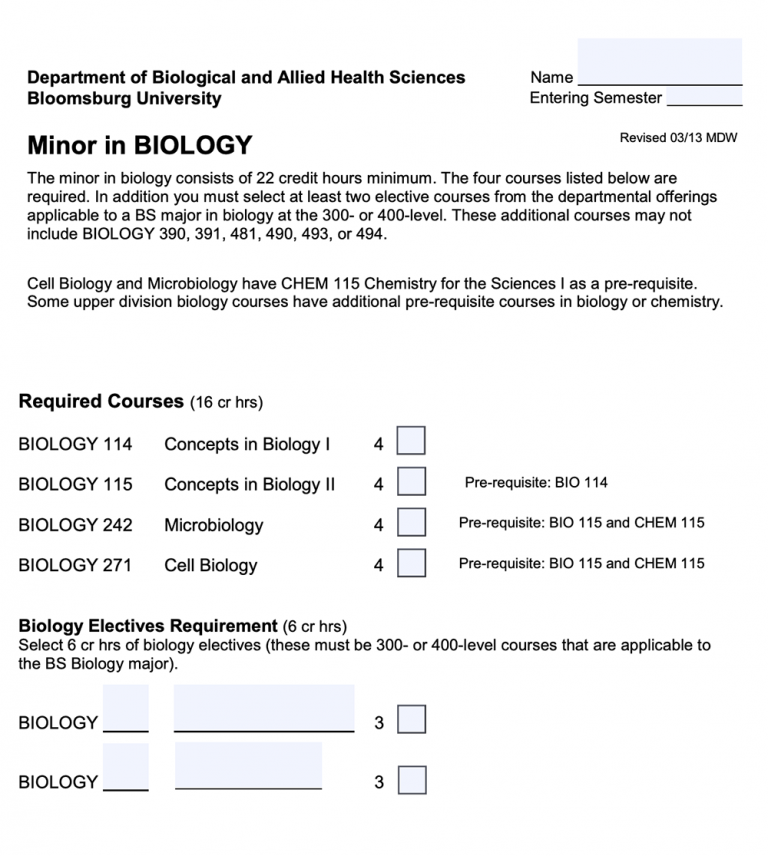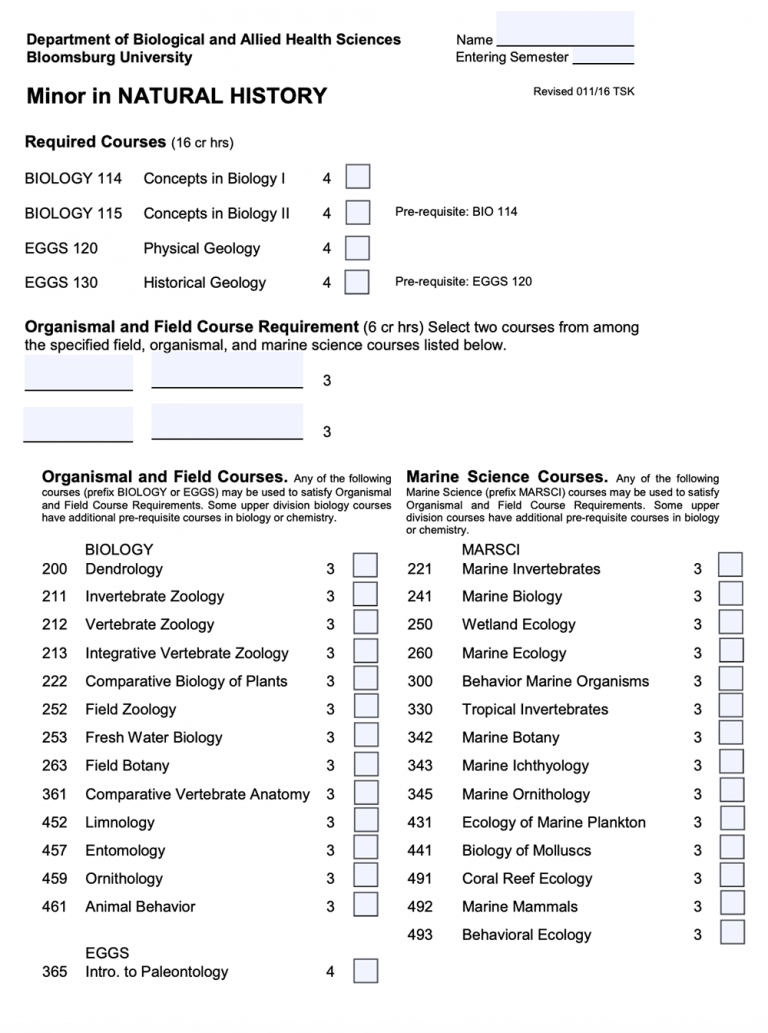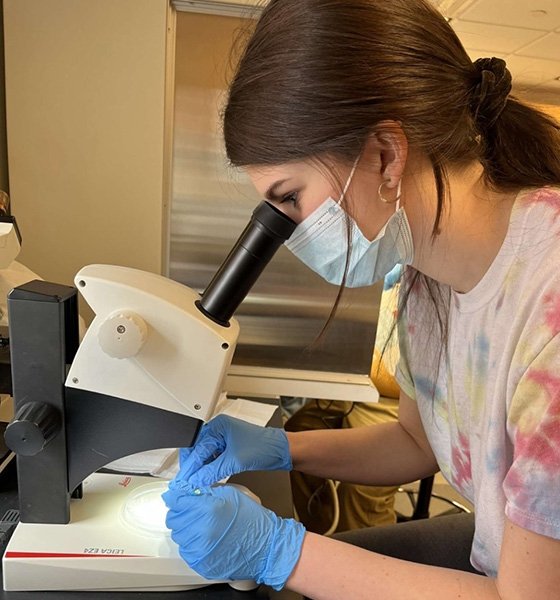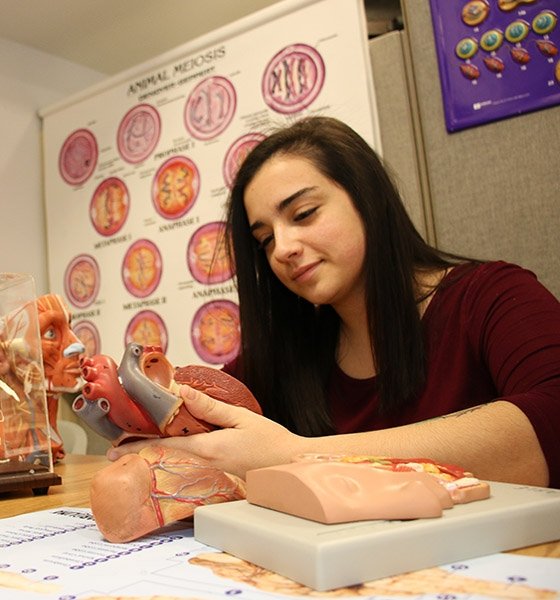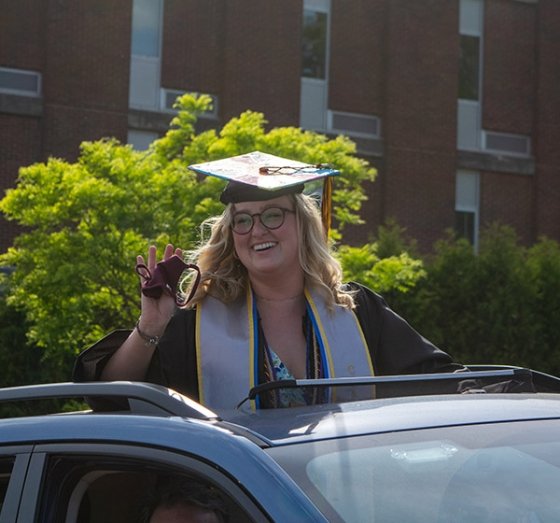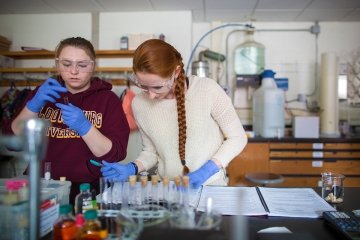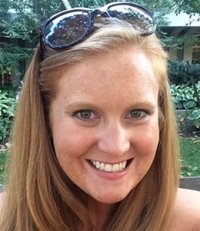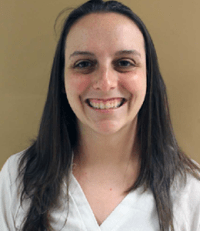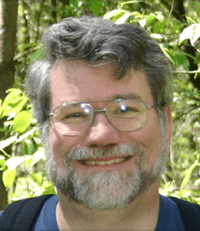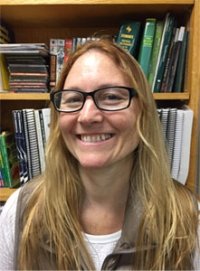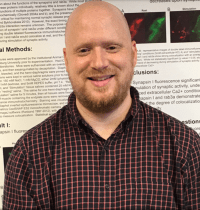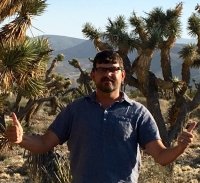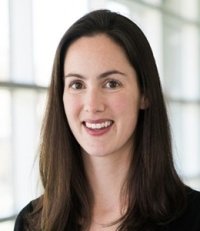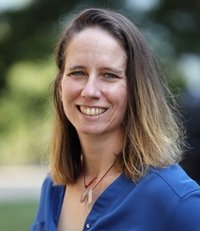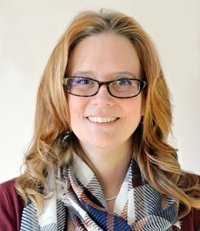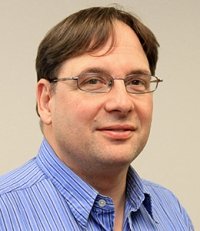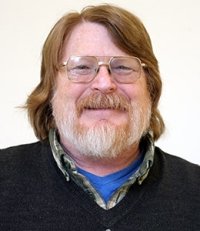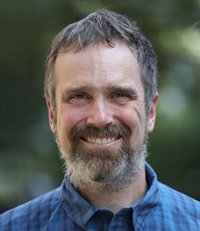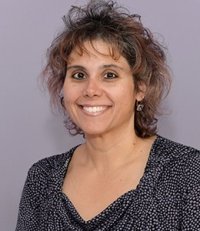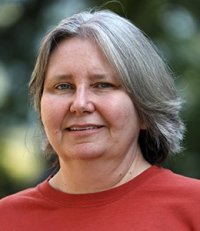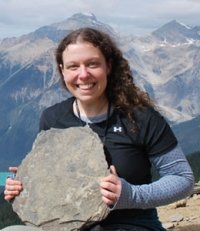Biology
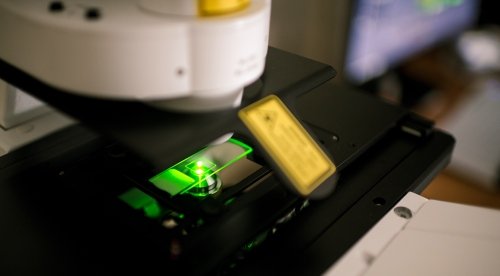
- Contact Information
-
- 570-389-4400
- Send an Email
-
115 Hartline Science Center
- Social Media
Bloomsburg's biology department hosts a range of specialties from molecular biology to ecology, from cell biology to whole organisms, from microbes to animals and plants. Courses are taught by Ph.D. faculty with extensive research experience who emphasize hands-on learning, practical skills, and critical thinking. Small classes allow individual attention and encourage participation.
Why pursue a degree in biology?
- It's well-rounded — Learning extends beyond the classroom. Optional interest housing provides biology and allied health majors with study partners and camaraderie in their dorm. Students can conduct independent research in the lab or field with a faculty mentor. Internships and clinical rotations provide real-world experience. Marine biology classes and research are available at the Marine Science Consortium’s field station at Wallops Island, Va.
- It's up-to-date — Computers and technology are incorporated into classroom and lab experiences. Students have access to state-of-the-art facilities and equipment, including remodeled laboratories.
- It's practical — Graduates are employed in a wide spectrum of careers or continue their studies in professional and graduate schools. Many enter the workforce as allied health professionals, as lab or field technicians, and as teachers. They work in private industry, research centers, healthcare facilities, schools, and government.
Biology (B.S.)
Our Bachelor of Science in Biology program provides a rigorous background in biology, chemistry, physics and mathematics. This program meets your needs if you plan to enter graduate or professional school in the natural sciences, wish to seek employment in the private sector and government agencies. Biology (B.S.) students may choose to specialize, electing an option in environmental biology, molecular biology, or pre-medical sciences (pre-med).
Ecology, Conservation and Field Biology
This degree provides a strong background in the biological sciences and the chemistry, physics, geology, and math working environmental biologists need. The requirements and electives are tailored to develop skills in ecology, field biology, and environmental sciences. This program prepares students for careers in environmental protection, natural resource management, and conservation with state and federal agencies and conservation organizations.
Molecular Biology
This degree provides a strong background in the biological sciences and the chemistry, physics, and math working biologists need. The biology requirements and electives are tailored to develop skills in molecular biology and biotechnology. This programs prepares students for careers with biotechnology companies; it is also excellent preparation for work in forensics labs.
Pre-Medical (Pre-Med) Sciences
This degree provides outstanding preparation for medical, veterinary, optometry, podiatry, chiropractic, and dental schools. Students completing this program have an over 90 percent acceptance rate to professional schools. Students in this major work closely with the Pre-Professional Committee to meet the requirements for professional study.
Biology (B.A.)
Our Bachelor of Arts in Biology program provides a firm background in biology and cognate sciences, while allowing for other interests to be pursued. Biology (B.A.) majors may select an option in Natural History. Students earning a degree in Secondary Education Biology may earn a B.A. in Biology as well. This degree, which provides a strong background in the biological sciences, has considerable flexibility and is a good choice for students who want to double-major or minor in another academic discipline.
Natural History
Prepare for a career in zoos, aquaria, science museums, and environmental education centers. This program includes a strong background in organismal and field biology with supporting coursework in geology and anthropology. The flexibility in this degree allows you to select courses that will prepare you to interact with the public.
Health Sciences (B.S.)
Our Bachelor of Science in Health Sciences programs provide a strong biology background in preparation for admission into clinical, research, medical, and graduate programs in the health sciences. Some of the most unique opportunities offered to undergraduate students connects them with expert faculty with human health related research, such as bioinformatics projects, and research of cancer biology.
Additional highlights of our programs include the health care practicum, junior seminar for preparation, and our high-quality clinical affiliations and placements for selected programs.
Pre-Accelerated Second-Degree Nursing
This program is designed to facilitate entry into a second degree nursing program upon graduation from Bloomsburg. Completion of this program does not guarantee admittance into our Accelerated Second Degree Nursing Program.
Pre-Pharmacy
Pharmacy is a health profession concerned with knowledge about drugs and their effects. Pharmacists prepare, dispense and administer drugs. They evaluate medication orders, and provide information and advice on drug selection, effects and interactions. The standard degree for a pharmacist today is the Doctor of Pharmacy - typically a six-year program. The first two years of the curriculum is broad-based and can be taken at an undergraduate institution such as BU. Students may apply to transfer after two years, or complete a bachelor's degree (we recommend the B.S. Health Sciences degree) before applying to a professional program. BU students have been admitted to a number of different pharmacy schools.
Pre-Physical Therapy
Physical therapists examine, diagnose and treat patients that have a variety of musculoskeletal, cardiac, neurological and pulmonary problems. They carry out programs to help increase a patient's strength and flexibility, to relieve pain and to help limit permanent physical disabilities. Most physical therapy degree programs are now offered at the doctoral level. We strongly recommend that students complete the B.S. Health Sciences degree, then apply for admission to a physical therapy program where they earn a doctoral (D. PT) degree. These programs are usually three years in length.
Pre-Physician Assistant
Physician assistants work under the supervision of and in collaboration with physicians. They provide a broad range of diagnostic, educational and therapeutic patient care services. Most physician assistant education programs are now at the masters degree level. We strongly recommend that students complete the B.S. in Health Sciences degree at BU and then apply to a masters physician assistant degree program. These programs are typically two years in length.
- Curriculum Guide
- Accredited Programs for Physician Assistant — ARC-PA | PAEA
Medical Genomics and Counseling
Genetic counseling can be seen as the health professional role concerned with the impact of genetic disease and genetic information on individuals and families. It has been predominantly concerned with the human problems arising in the context of single gene disorders, chromosome rearrangements and malformation, including syndromes of neurodevelopmental disturbance and dysmorphic physical features.
These are the core conditions dealt with in genetic counseling practice on both sides of the North Atlantic, although the scope of genetic counseling does vary between countries so that, for example, North American genetic counselors are often heavily engaged in the offer of routine antenatal screening to pregnant women, whereas this is not standard practice in Europe. As genomic analysis enters clinical medicine, it is timely to reflect on the impact that this will have on genetic counseling practice.
Medical Lab Science Option
Medical laboratory scientists perform many of the laboratory tests used in the detection, diagnosis and treatment of diseases. As part of the health care team they contribute data on blood, tissues and fluids using a variety of precise methods and technologies. The program of study combines natural science and liberal arts education with clinical instruction.
Students complete 90 credit hours (three years) of core science and general education classes at BU followed by one calendar year in a hospital clinical program accredited by the National Accrediting Agency for Clinical Laboratory Sciences (NAACLS). Students earn the B.S. degree from BU and are eligible to sit for national certification exams. Our program is rigorous and demanding. It attracts individuals who have strong quantitative and analytical skills. Students should be prepared to study in both an academic and clinical environment and have a strong background in the sciences.
In the past five years, the clinical placement rate for these students has been excellent. However clinical placement is becoming more competitive and admission to the clinical year experience is not automatic or guaranteed. Students begin the application procedure after completing two academic years, usually the summer following the sophomore year. Assistance in making application for admission is offered by the university, but admission is determined solely by the clinical affiliates. Presently, Bloomsburg is affiliated with eight hospitals. Students who successfully complete all of the requirements and the clinical year earn a Bachelor of Science in Health Sciences degree and are eligible to take the national certification examinations for medical laboratory scientist.
Clinical Affiliates and Adjunct Faculty
Pennsylvania College of Health Sciences
850 Greenfield Rd., Lancaster, PA 17601
Ms. Carol Bond, Program Director, Medical Laboratory Science
717-947-6193; csbond@pacollege.edu
Reading Hospital and Tower Health System
School of Health Sciences
P.O. Box 16052, Sixth Ave. & Spruce St., Reading, PA 19612
Mr. Ethan Kentzel, MLS (ASCP), Program Director, Medical Laboratory Science
484-628-7898; ETHAN.KENTZEL@towerhealth.org
Robert Packer Hospital
One Guthrie Square, Sayre, PA 18840
Stacy Pond, MS, MLS (ASCP) CM, Program Director, Medical Laboratory Science
570-887-4736; Stacy.Pond@guthrie.org
St. Christopher's Hospital for Children
Erie Ave at Front St. Philadelphia, PA 19134
Ms. Susanne Dannert, Program Director, Medical Laboratory Science
215-427-5306; susanne.dannert@tenethealth.com
UPMC Susquehanna Williamsport
700 High Street, Williamsport, PA 17701
Ms. Christine Wheary, Program Director, Medical Laboratory Science
570-321-2367; cwheary@susquehannahealth.org
Thomas Jefferson College Health Professions
130 S 9th St., Suite 1924, Philadelphia, PA 19107
Ms. Valerie Jalicke, Program Director, Laboratory Sciences
215-503-2792; valerie.jalicke@jefferson.edu
Well Span Health/York Hospital
1001 South George St., York, PA 17405
Mr. Edwin Beitz, Program Director, Medical Laboratory Science
717-851-2473; ebeitz@wellspan.org
Medical Imaging (B.S.)
Medical imaging technologists are allied health professionals who have expertise in the operation of imaging equipment and the preparation of patients for various diagnostic and treatment procedures. Practice specialties may include competencies in radiography, nuclear medicine, sonography, radiation therapy, cardiovascular technology, magnetic resonance imaging, computed tomography, positron emission tomography, and mammography.
This degree program offers a range of academic pathways leading to a baccalaureate degree. Students spend between two and three years (60 to 90 credits) at BU and then one to two years (30 to 60 credits) in an accredited hospital-based clinical program. The time spent in each will depend on which clinical option(s) is/are selected. This major is not open to transfer students.
Our Master of Science Biology program offers opportunities for study at the supra-organismal, organismal, cellular, and molecular levels of biology. A broad array of disciplines is represented among the faculty, allowing considerable flexibility in the selection of independent research topics. Thesis research may be carried out on campus, or at an off-campus site.
- Thesis Option — This option is recommended for students planning to continue their graduate studies or professional training. Students must complete a total of 30 credit hours of graduate course work, with at least 18 semester hours at the 500 level. A thesis is required for this option. Normally a student in this option will take 6 hours of thesis, and 24 hours of formal classroom course work. The thesis must be defended orally. Students in the Thesis Option do not carry out a Directed Study, as that experience is intended for the Nonthesis Option.
- Nonthesis Option — Students must complete a total of 30 credit hours of graduate course work, with at least 18 hours at the 500 level. Students choosing this option will not carry out a thesis. There are two suboptions within the nonthesis option.
- Directed Study Suboption — Students must complete at least 27 credit hours of graduate course work, and 3 credit hours of Directed Study in Biology. A directed study is a hands-on research experience smaller in scope than a thesis. Typically the directed study is completed within one semester. A written report is prepared, and presented orally to the Department.
- Departmental Paper Suboption — Students must complete at least 30 credit hours of graduate course work. They must complete a literature-based paper on a topic selected by the student and the academic advisor or mentor for the paper. The BAHS Departmental Paper carries no credit hour equivalent. The paper must be presented orally to the BAHS Department.
3+2 Biology (M.S.)
The Master of Science Degree is rapidly becoming the professional working degree in Biology. Professional biologists work in positions such as microbiologist, zoologist, wildlife biologist, biological technician, to highlight but a few of the diverse job opportunities. These professions are expected to experience better than average growth, adding ca. 23,600 new jobs to a 2012 base of ca. 210,400 jobs, for an 11 percent projected growth during the decade following 2012.
The U.S. Department of Labor reports median pay for jobs in these areas ranges from $39,750 to $66,260 per year. However, to enter and advance in these jobs generally requires training beyond the baccalaureate. To be competitive, professional biologists often need more laboratory and field experience, and a greater diversity of areas of competence, than can easily be encompassed in a traditional four-year undergraduate program. Answering the growing need for advanced graduate-level preparation for students pursuing careers as technicians, laboratory managers, research assistants, and etc., the accelerated combined bachelor's and master's curriculum in biology implements a focused career development tract emphasizing the development of a broad diversity of advanced laboratory, field, and career skills.
Our Department of Biological and Allied Health Sciences offers Bachelor of Science and Bachelor of Arts degrees in several curriculum-options reflecting sub-disciplines, levels of biological organization, and areas of interest within the life sciences. A seamless progression of coursework, culminating in both a bachelor's and a master's degree, is extremely attractive to the best students because it affords them the opportunity to pursue graduate work early in their academic career, and allows them to enter the job market with the credentials most likely to allow them to secure a position and advance in their career. Pursuing these credentials in a traditional, stand-alone Bachelor's and Master of Science degree programs would require a minimum of six years of study. In contrast, the accelerated program at BU can be completed in only 5 years.
For more information about Current graduate students visit the Graduate Student Research Page.

